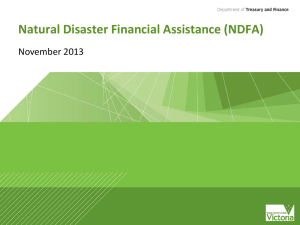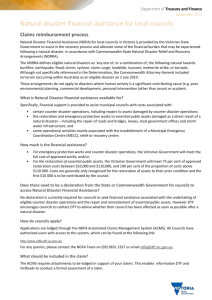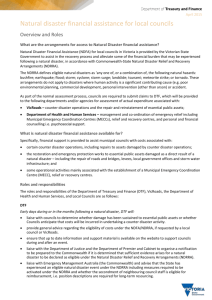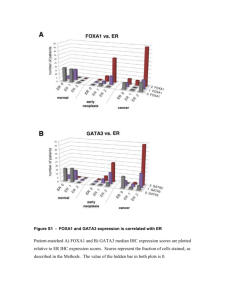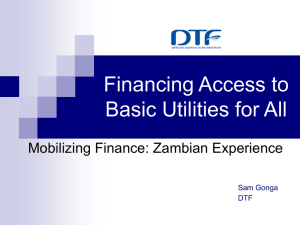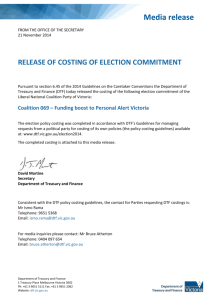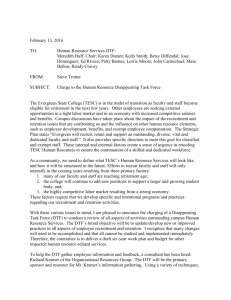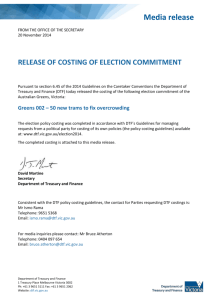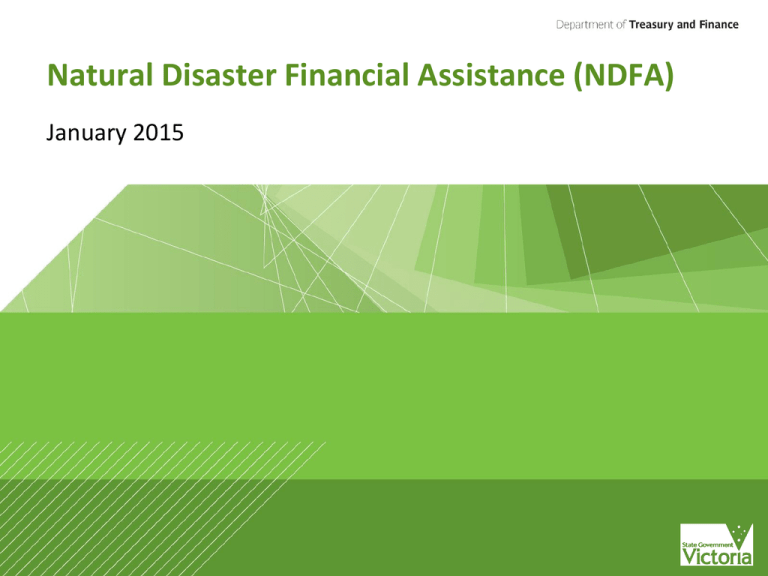
Natural Disaster Financial Assistance (NDFA)
January 2015
Overview of the NDFA
• Alleviates some of the financial burden experienced
following a natural disaster to:
- municipal councils & Catchment Management Authorities
(CMAs);
- Individuals & households (personal hardship grants); &
- primary producers, small businesses & not-for-profit
organisations (Concessional loans & Clean up & Restoration
Grants)
• Mirrors the joint State-Commonwealth Natural
Disaster Relief & Recovery Arrangements (NDRRA).
Eligible natural disasters
Assistance is available for:
•
•
•
•
•
Bushfire
Earthquake
Flood
Storm or storm surge
Tornado
• Cyclone
• Landslide
• Tsunami
• Meteorite strike
Terrorism now included
Non-natural disasters not
eligible includes:
•
•
•
•
Drought
Frost
Heatwave
Epidemic
•
Events where human activity
is a significant contributing
cause (other than arson)
Notification of Events
As soon as possible after an event, councils should advise
DTF of:
• damage to essential public assets
• If undertaking counter disaster activities or
establishing a MECC, Relief or Recovery Centre
• any changes to damage estimates after advising them
to DTF
Eligible costs which Councils can claim
• Counter disaster operations (including repairs to
facilities damaged by counter disaster operations)
• Emergency protection works
• Restoration of essential public assets damaged as a
direct result of a natural disaster to its pre-disaster
standard in accordance with current building and
engineering standards
• Some additional operational costs mainly associated
with the establishment of a MECC, Relief Centres
and/or Recovery Centre (subject to activation of the
event under the NDRRA)
Ineligible costs
Include:
• Normal maintenance & administration costs including
salaries, day labour costs & other ongoing
administrative type expenditure which would have
been incurred even if the natural disaster had not
occurred
• Costs associated with restoring natural vegetation,
natural banks, streams, rivers, beaches & undeveloped
land
• Costs incurred in mitigating, restoring or replacing an
asset to a more disaster resilient level or higher level of
service (unless otherwise agreed)
Restoration of Essential Public Assets
Definition under the NDRRA has narrowed to:
- An integral & necessary part of the State’s infrastructure
associated with health, education, transport, justice or
welfare
Eligible assets include:
- Road & bridge infrastructure, footpaths, levees, local
government offices & storm water infrastructure
Restoration of Essential Public Assets
• Sporting & community facilities, religious
establishments & memorials now generally excluded
including walking trails, piers and wave energy
dissipation structures
• Assets need to be owned by the council
• Eligibility issues should be directed to the NDFA team,
DTF, in the first instance at:
(03) 9651 2327 or ndfa@dtf.vic.gov.au
Applying for financial assistance
• Councils can apply for assistance through:
- Claims (reimbursement of actual expenditure incurred); or an
- Advance Payment request
• The DTF website provides
- A link to the Automated Claims Management System (ACMS)
- Guidelines on eligible costs associated with:
a. salaries and overtime costs
b. Restoration of essential public assets
c. Counter disaster operations
d. Relief and recovery centres
Advance Payment process
• Where financial hardship can be demonstrated, an
advance payment may be requested to assist with cash
flow in commencing repair or restoration works
• Previously, Advance payment requests have been
made in writing to DTF
• Future advance payment requests can now be made
electronically
Advance Payment process cont.
• Advance payment requests are subject to approval by
DTF Secretary
• Councils will receive confirmation of advance
payments approved
• Justification Claims (offsetting against the advance) are
required to be submitted to DTF regularly
• VicRoads will undertake formal assessment of
expenditure as per the normal claims process
Claims Process
• Councils required to submit Claims for actual eligible
expenditure regularly to DTF i.e. at least quarterly
• All restoration works to be completed within the
allowable time period - 2 years from the end of the
financial year in which the natural disaster occurred
• Final claims should be submitted by the end of
September following the allowable time period (except
for large infrastructure projects)
• Expenditure will be formally assessed by VicRoads
Automated Claims Management system (ACMS)
• Replaces old paper based
processes for advances,
claims, assessments and
approvals
• It also replaces DTF’s
manually maintained
database
• The system uses a web
interface to move claims
between council,
VicRoads and DTF
Benefits
The new system will enable councils to:
• lodge claims and requests for advances
• submit supporting documentation with the claim
• cancel claims
• track progress of claims and view the status of all
claims
• provide real time data on the balance of advances
• reduce the need for manual processing of data or
duplicate processing
• eliminate the need to reconcile council data with DTF
data
The system will also:
• Speed up the transfer of documentation between
councils, DTF and VicRoads
Plans for roll out
• System anticipated to “go live” late
November/early December 2014
subject to final user acceptance testing
feedback
• Regional and metro training sessions - DTF will work
with councils to accommodate any needs given
upcoming bushfire season
• User manuals will be provided
• Help desk support is available by calling NDFA
Support on (03) 9651-2327 during office hours.
Plans for roll out
Subject to final user acceptance testing
feedback, it is anticipated that the new
system will be used for claims for all
events occurring in the 2014 year and
onwards:
• January 2014 Bushfires
• February 2014 Bushfires
• East Gippsland Floods (June 2014)
• Victorian Storms (24 June 2014)
• Victorian Storms (July 2014)
• any future events
Copyright (C) 2013. State of Victoria. All rights reserved.
The information contained in this presentation is provided by the
State of Victoria for information purposes only. While the State
of Victoria has made every effort to ensure the information
contained in this presentation is free from error, the State of
Victoria does not warrant or represent its accuracy, adequacy or
completeness. All information detailed in this presentation is
subject to change without notice.

